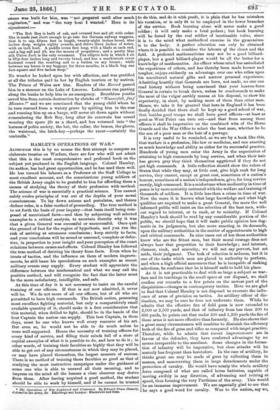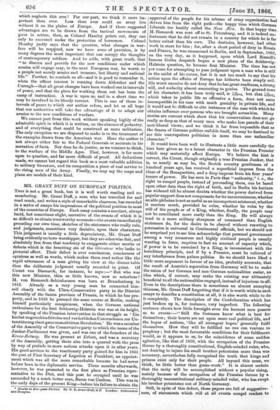HAMLET'S OPERATIONS OF WAR.*
ALTHOUGH this is by no means the first attempt to compose an elaborate treatise on Warfare, there are few who will not admit that this is the most comprehensive and profound book on the subject yet produced in the English language. Colonel Hamley, its author, has had great opportunities, and he has used them well. He has turned his labours as a Professor at the Staff College to most excellent account, and the conscientious young soldiers of the British Army ought to be grateful to him for affording them a means of studying the theory of their profession with method. The science of war is essentially a practical science. You cannot safely evolve principles of war out of the depths of your moral consciousness. To lay down axioms and postulates, and thence .deduce rules, is a false method of proceeding. The true method is to set forth the basis of your inquiry—that basis itself being com- posed of ascertained facts—and then by subjecting well selected examples to a critical analysis, to ascertain thereby why it was that a given General was successful or unsuccessful. Once quit the ground of fact for the region of hypothesis, and you run the risk of arriving at erroneous conclusions ; keep strictly to facts, and your conclusions will be sound or unsound, 'complete or defec- tive, in proportion to your insight and your perception of the exact relations between causes and effects. Colonel Hawley has followed the true method of deriving his theory from facts. Even when he treats of tactics, and the influence on them of modern improve- ments, he still bases his speculations on such examples as recent military events may supply. Every student will appreciate the difference between the mathematical and what we may call the positive method, and will recognize the fact that the latter must be the more satisfactory, intelligible, and safe.
At this time of day it is not necessary to insist on the careful training of our officers. If that is not now admitted, it never will be. We do not mean of all our officers, but of all who are permitted to have high commands. The British nation, possessing most excellent fighting material, but only a comparatively small available quantity of it, should make it a first consideration that this material, when drilled to fight, should be in the hands of the best Captain the nation can supply. This best Captain, in these days, must be one who knows well every resource of his art. But even so, he would not be able to do much unless he were well supported. Hence the necessity of training officers for every kind of service, and filling their minds full of a store of capital examples of what it is possible to do, and how to do it ; in ether words, of training their faculties so highly that they will be able to get out of any circumstances in which they may be placed, 'or may have placed themselves, the largest measure of success. There is no method of training those faculties so good as that of studying the most instructive campaigns under the guidance of some one who is able to unravel all their meaning, and to impress on the mind all the lessons a close observer may derive from them. After having acquired a good method, the student should be able to work by himself, and if he cannot be trusted
• The Operations of War Explained wad Illustrated. By Edward Bruce Handy, Caenel in the Army, ae. Edniburgli and Loudon: Blackwood and Bons.
to do this, and do it with profit, it is plain that he has mistaken his vocation, or is only fit to be employed in the lower branches of the service. Book learning alone will never make a good soldier ; it will only make a fatal pedant; but book learning will be found by the real soldier of inestimable value, since it is to the mind what methodical exercise in the gymnasium is to the body. A perfect education can only be obtained where it is possible to combine the labours cif the closet and the field. A profound mathematician may not be a good billiard- player, but a good billiard-player would be all the better for a knowledge of mathematics. An officer whose mind has assimilated the experience of others, and has thereby been made keener and tougher, enjoys evidently an advantage over one who relies upon his uncultured natural gifts and narrow personal experience. Admitting heartily that Generals are born, not made, no one can read history without being convinced that your heaven-born General is certain to break down, unless he condescends to make the most of the vulgar earthly means at his disposal, to show his superiority, in short, by making more of them than other men. Hence, we take it for granted that here in England it has been finally decided that there shall be kept up a good school of war, that besides good troops we shall have good officers—at least as good as West Point can turn out—and that from among these officers it shall be imperative on the combined wits of the Horse Guards and the War Office to select the best man, whether he be the son of a poor man or the heir of a peerage.
It is very useful to be reminded, as we are by a book like this, that warfare is a profession, like law or medicine, and one exacting as much knowledge and ability as either for its successful practice. Hundreds of young men enter the Army in the expectation of attaining to high commands by long service, and when their hair has grown grey they think themselves aggrieved if they do not get high commands. A little reflection should show the rulers of States that while they may, at little cost, give high rank for long service, they cannot, except at great cost, sometimes of a nation's honour, sometimes of a nation's independence, give, for long service merely, high command. It is a misfortune when mediocrity in time of peace is by mere seniority entrusted with the welfare and training of thousands of soldiers. It is little less than a crime in time of war. Now the more it is known what large knowledge and what high qualities are required to make a great General, the more the well informed public will insist on the selection of the beat men, with- out regard to interest, or to rank, or to seniority. If Colonel Hamley's book should be read by any considerable portion of the public, we should hope that it will make public opinion less dog- matic in its judgments, but also more exacting in its demands, upon the military authorities in the matter of appointments to high and critical commands. In nine cases out of ten those authorities know who are the fittest men, but their moral courage does not always bear that proportion to their knowledge ; and interest, clamour, rank, and seniority, we will not say pervert, but set aside, their judgment. The task of selection is arduous, but it is one of the tasks which men are placed in authority to perform, and when a high official announces that he is incapable of making selections, he confesses that he is himself unfit to hold his place.
As it is not practicable to deal with so large a subject as war- fare and its teachings in the small space at our disposal, we shall confine our remarks to a few points on the newest part of the disquisition—changes in contemporary tactics. Here we are glad to find that Colonel Haruley is not disposed to overrate the influ- ence of arms of precision on tactics. An artillery officer of dis- tinction, we may be sure he does not underrate them. While he admits that the effective fire of field guns is now extended to 2,000 or 2,500 yards, and that of infantry from less than 200 to 600 yards, he points out that under 200 and 1,200 yards the fire of these arms is not more effective than formerly. He also shows that a great many circumstances will combine to diminish the efficiency both of the fire of guns and rifles as compared with target practice. Therefore, while he admits that recent improvements are in favour of the defender, they have conferred advantages by no means insuperable to the assailant. Some changes in the forma- tion of infantry will be imperative, but close attacks will be scarcely less frequent than heretofore. In the case of artillery, he thinks great use may be made of guns by collecting them in masses, and manceuvring them in large detachments under the protection of cavalry. He would have nearly the whole artillery force composed of what are called horse batteries, capable of moving swiftly in any direction, of advancing and retiring at speed, thus forming the very Parthians of the army. This would be an immense improvement. We are especially glad to see that he says a good word for cavalry. Woe to the nation, say we, which neglects this arm! For our part, we think it more im- portant than ever. Leas than ever could an army live without it on the plains of Europe. And if these suggested advantages are to be drawn from the tactical movements of guns in action, then, as Colonel Hamley points out, they can only be executed under the protection of horsemen. Colonel Hamley justly says that the question, what changes in war- fare will be required, now we have arms of precision, is by many degrees the most important that can occupy the thoughts of contemporary soldiers. And he adds, with great truth, that "to discern and provide for the new conditions under which armies will engage may, in the next European war, be worth to a people not merely armies and treasure, but liberty and national life." Further, he reminds us all—and it is good to remember it, when the officer interest is running down Aldershot and the Curragh—that all great changes have been worked out in intervals of peace, and that the place for working them out has been the camp of instruction. A war is upon us, and in a short time we may be involved in its bloody torrent. This is one of those in- tervals of peace to which our author refers, and let us all hope that our authorities will take due advantage of it to adapt our armies to the new conditions of warfare.
We cannot part from this work without speaking highly of the admirable spirit in which it is written, on the absence of pedantry, and of everything that could be construed as mere militarism. The only exception we are disposed to make is to the treatment of the examples drawn from the American war. Here the author is not always either fair to the Federal Generals or accurate in his narration of facts. Nor does he do justice, as we venture to think, to the warfare of the Middle Ages. That, however, is far more open to question, and far more difficult of proof. All deductions made, we cannot but regard this book as a most valuable addition to military literature, and its composition a piece of real service to the rising men of the Army. Finally, we may say the maps and plans are models of their kind.































 Previous page
Previous page